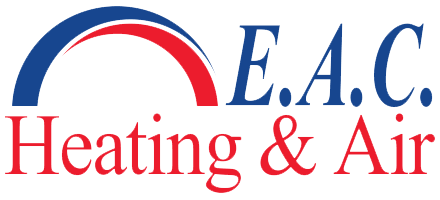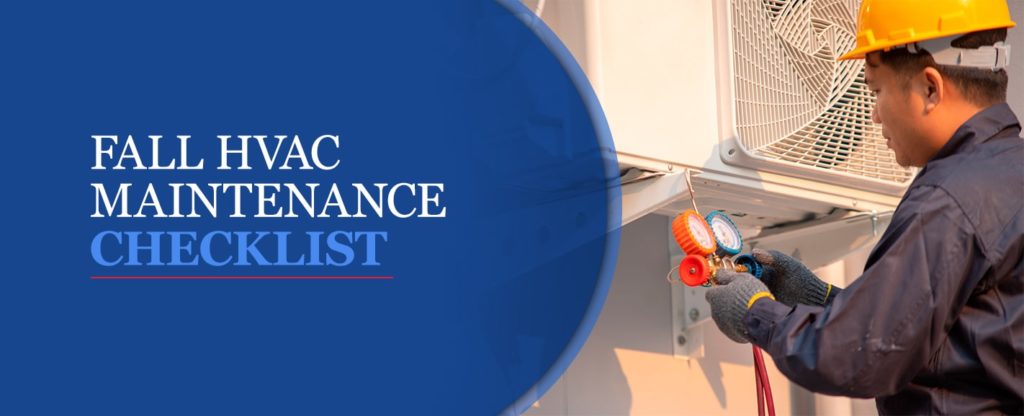
With the summer months quickly coming to a close, it’s almost time to prepare for the fall weather. As a result, it’s necessary that you check your heating, ventilation and air condition (HVAC) system to ensure it’s ready for the change of season. The last issue anyone wants to deal with is a broken heater as soon as it begins to get cooler outside.
Because autumn weather can be extremely unpredictable, it’s important to have all of your HVAC appliances ready for use. Keep reading for a comprehensive fall HVAC maintenance guide to keep your system at peak performance throughout the colder seasons.
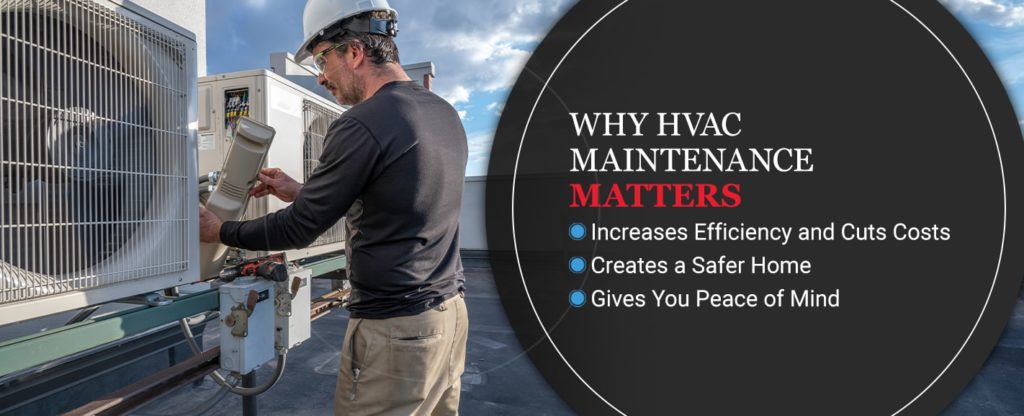
Why HVAC Maintenance Matters
The heating and cooling system in your home plays an important role in keeping you and your family comfortable. Performing regular HVAC inspections and maintenance will help you create a suitable indoor environment, so you’re never too hot or too cold. Overall, consistent HVAC maintenance helps to protect against malfunctions, energy waste, higher running costs and diminished cooling capacity.
Increases Efficiency and Cuts Costs
HVAC maintenance should be a top priority for you because it can save you money in the long run. For example, well-maintained HVAC appliances are more energy-efficient. If you keep your heating and cooling systems clean, they require less energy to achieve optimal temperatures, and using less energy minimizes operational costs. The United States Department of Energy states that prioritizing high efficiency can cut energy use by 50% for some HVAC systems.
In addition to increased energy efficiency, keeping your HVAC system in good condition can extend its service life. Routinely checking your appliances allows you to catch minor problems or malfunctions before they become larger issues that could cause system failures and even property damage. Spotting any possible issues ahead of time can lead to fewer repair bills or lower costing fixes.
Creates a Safer Home
While proper maintenance can keep you within your household budget, it can also protect you and your home. Taking time to inspect your HVAC system can help you prevent emergencies, including fires, carbon monoxide leaks and decreased air quality. This protection also reduces any costs you’d have to spend if you encountered a sudden situation from your HVAC malfunctioning.
With seasonal checks and cleaning, you’ll have optimal HVAC performance, maximizing airflow. This also improves your home’s air quality, allowing you and your family to breathe more easily, which is especially crucial if anyone in your household suffers from asthma, allergies or other breathing issues.
Gives You Peace of Mind
Another reason to check your HVAC system is that routine maintenance can just simply be more convenient for you. Instead of having to deal with an unexpected system failure and improper household temperatures, occasionally checking your HVAC system allows you to catch any potential issues and deal with them when it’s convenient for you. This also allows you to schedule an appointment with an HVAC company you trust rather than being forced to make an emergency appointment with whichever company has the soonest availability.
Keeping your HVAC system in working order is beneficial to your household in numerous ways, so you should take any possible issues with your system seriously. By thoroughly checking your HVAC appliances every 90 days, or at least seasonally, you can prepare ahead of time for any foreseeable issues. Make sure you have a proper understanding of your HVAC system and call a professional if any problems arise.
Fall Maintenance Checklist for HVAC Systems
What does HVAC maintenance include? There are many factors that affect the type of regular maintenance your heating and cooling system may need. The first point to consider is if you have one unit that controls both heat and air or if you have separate systems for heating and cooling. This way, you can break down your checklist according to your specific system layout.
Because winter is a busy time for most HVAC technicians, fall is the perfect time to tackle routine maintenance. If you live in a location with cold winters, you may have to wait longer than you’d like to have a technician come and service your heating system. It’s better to prepare for the changing weather ahead of time, so you don’t run into problems after the weather dramatically changes.
Here are six HVAC maintenance tips for fall.
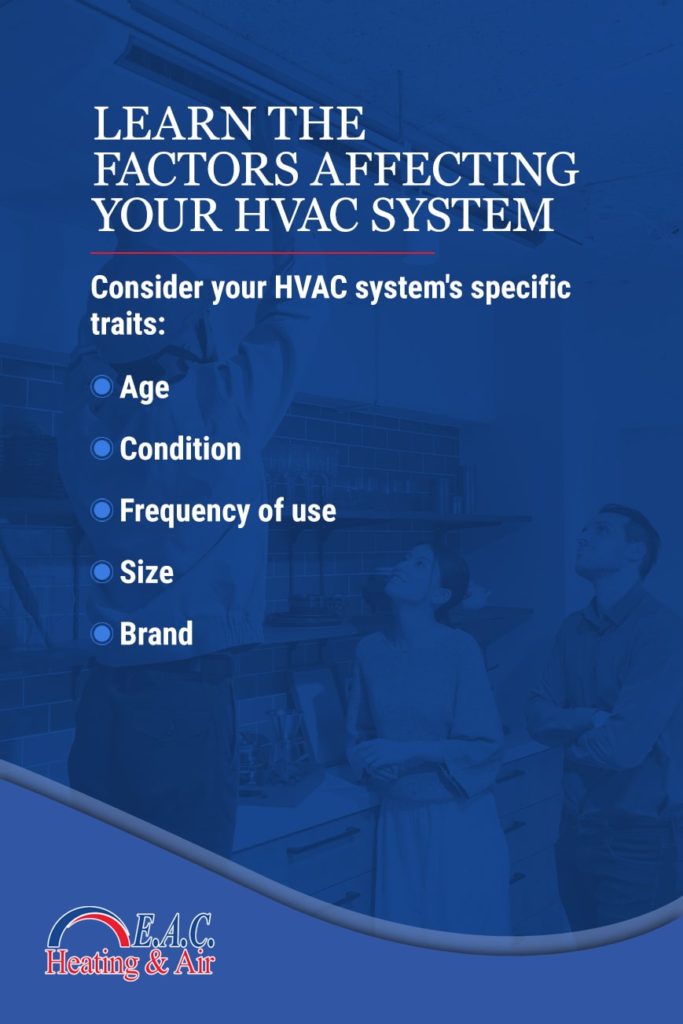
1. Learn the Factors Affecting Your HVAC System
Everyone’s heating and cooling situation is going to be different heading into the fall season, so you’ll want to keep some things in mind pertaining to your personal situation. Consider your HVAC system’s specific traits:
- Age: Older HVAC systems could be more prone to issues than systems installed in the past few years. This depends on a few other factors, but if you know your HVAC system has been around for a while, it may be time for some extra repair work, maintenance or even a replacement.
- Condition: Whether new or old, the condition of your HVAC system plays a big role in how it functions — you may know from past experience that your HVAC system is in rough shape. For example, maybe it only works half the time, or perhaps it seems lacking in the heating department on the coldest winter days. These are signs that it’s time to invest in some solid maintenance or a replacement.
- Frequency of use: How often you use your HVAC system can also impact its longevity and functionality. In areas with extremely cold winters or swelteringly hot summers, you may find yourself using your system often. This high level of use can contribute to a shorter lifespan for your HVAC unit and more frequent repairs.
- Size: Be sure to take your HVAC unit or system’s size into consideration. If you feel like your system is struggling to heat your home as the days get cooler, it could be that it’s simply too small for the area it’s heating. If you’re trying to heat a large space like a family room, you’re going to need a unit that’s able to match that size. Talk to an HVAC professional to see if they’d recommend upgrading to adequately heat your space.
- Brand: The brand of your HVAC system will also affect its performance. Some are strong in certain areas and weak in others. Research your HVAC system’s brand to find out any aspects that have caused problems for other users. This can help solve some of your questions as to why your system is working worse than you expected and what you can do to fix the problem.
These factors can alter the functionality of your system and cause solutions and fixes to vary. Despite the differences in HVAC systems, there are some actions you should take regardless. With the following tips, you’ll be more equipped to understand the issues as they come, and you can even help boost your system’s performance and extend its life. Continue reading to discover maintenance tasks every HVAC owner can benefit from doing.
2. Replace the Filters and Clean the Vents
Replacing the system’s air filters is the most important way to start off your fall HVAC checklist. Maintaining airflow is key to a functional HVAC unit, and the best way to ensure maximum airflow is to replace its filters.
Both heating and air conditioning take up about half of a household’s energy costs. Replacing dirty filters can lower energy consumption between 5% and 15%. General recommendations state you should change air filters about once every 30 to 90 days depending on filter type and brand.
Similarly, avoid the buildup of dust and debris in the vents. This will help keep the filters clean and prevent mold and algae from growing in your vents. If there’s excessive debris when you change the filter and clean the vents, it’s most likely a sign that there’s an underlying issue. Therefore, after cleaning the vents, consider what may have caused excess buildup and solve the problem before it worsens.
3. Remove Dirt and Debris on the Outside of the Unit
For the same reasons that you need to clean your filters and vents, you also need to remove dirt and debris from on and around the outside units. It’s easy for debris such as grass, leaves, dirt, pollen and other materials to build up around outdoor units.
Keeping the outdoor mechanisms clean improves airflow and air quality and helps keep your ventilation systems from getting clogged. Simply ensuring your outdoor units are clean can help increase energy efficiency and prolong the life of your HVAC system.
4. Check the Thermostat
Between every season, check your thermostat to make sure you have it set correctly at a reasonable temperature.
Consider investing in a programmable thermostat or a smart thermostat that lets you set your heating and cooling system to turn on and off at different times of the day. This way, you can adjust your thermostat to match your schedule, increasing your energy efficiency and saving you money.
For example, if you’re at work on weekdays, you can set your heating or cooling system to turn off around the time you leave and turn on just before you get home. If your schedule differs on weekends, programmable thermostats let you set specific temperatures on a day-by-day basis to accommodate any schedule changes or differences in routine.
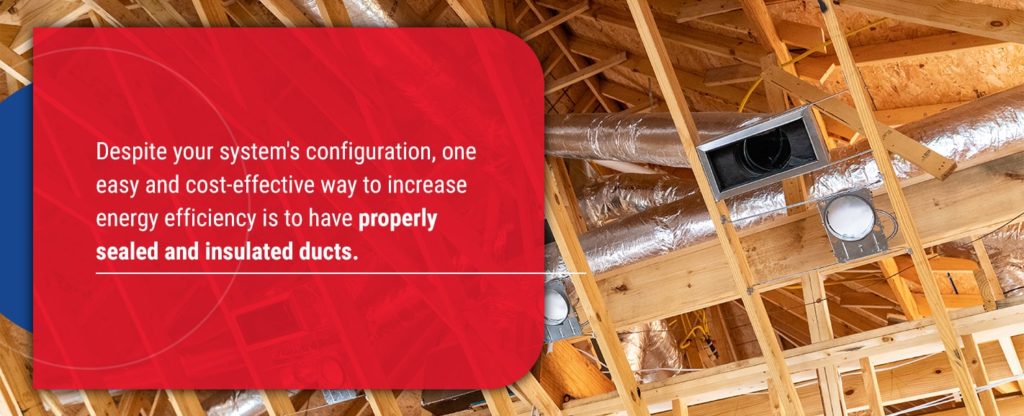
5. Inspect Insulation and Ductwork
Now’s the perfect time to check your insulation and ductwork so you can fix any issues before you even need to turn the heat on. The air ducts are pathways your heating and cooling units use to push air into the rooms in your home. Different houses have various air duct configurations, and some newly renovated systems are more energy-saving than older ones.
Despite your system’s configuration, one easy and cost-effective way to increase energy efficiency is to have properly sealed and insulated ducts. If the ducts leak heated air en route to the designated rooms, they lose heated air to unheated spaces, making your HVAC system work harder to reach your desired temperature.
Solve this problem by checking the sealing of the ducts and their insulation. If you have older ductwork, consider upgrading the entire system — or at the very least, updating your insulation.
6. Examine All Alarms
In case of an emergency, you want to inspect all of your alarms, including your carbon monoxide detector and smoke alarm system.
The colder months can be especially dangerous for carbon monoxide, as carbon monoxide exposures and poisonings happen more often due to the increased use of gas heaters, stoves, water heaters and furnaces. Fortunately, carbon monoxide issues are easy to prevent by properly maintaining your gas appliances and carbon monoxide detector.
Checking your smoke detectors and alarms is also a smart idea in the fall. Like carbon monoxide exposure, house fires are more common in the colder months, both from heating appliances and outside factors. While not a part of your HVAC system, you should always ensure you have an operation fire extinguisher in your home at all times — and extra batteries are always helpful, as well.
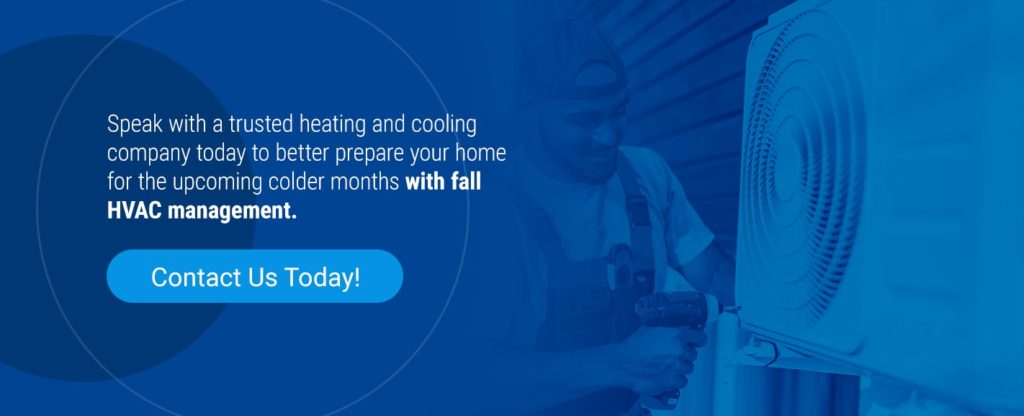
Work With E.A.C Heating & Air for Professional HVAC Services
While there are preventative steps you can take on your own to increase your safety and the lifespan of your HVAC system, the best way to ensure proper fall HVAC maintenance is to schedule your HVAC checkup maintenance with a technician.
Talk to a professional about your fall maintenance checklist to ensure it covers everything you need to look at before the cold weather arrives. Don’t be afraid to ask questions and inquire about advice for the best seasonal practices for your HVAC systems. Ultimately, the more you know about your heating and cooling appliances, the better prepared you are for any mishaps.
Speak with a trusted heating and cooling company today to better prepare your home for the upcoming colder months with fall HVAC management. For trusted, reliable HVAC services in Hilton Head, South Carolina, contact E.A.C. Heating & Air.
